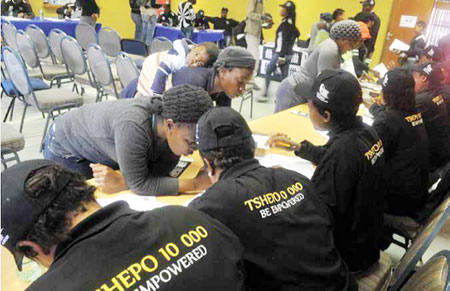Tshwane skills programme targets the youth
Tshwane skills programme targets the youth andileLocal government
When Nteseng Mogorosi finished matric in 2004 he knew he wanted to be in business for himself, because he believed it would give him the freedom.
 He enrolled at the University of the Witwatersrand to gain a Bachelor of Accounting Science degree, but, unfortunately, he could not complete his studies due to financial challenges.
He enrolled at the University of the Witwatersrand to gain a Bachelor of Accounting Science degree, but, unfortunately, he could not complete his studies due to financial challenges.
However, power utility Eskom gave him a second chance to study for a National Diploma in Financial Management at the Central Johannesburg College, through a learnership programme offered by the entity.
When he completed his studies in 2009, he was offered a permanent job as an accounts payroll officer at Eskom.
However, Mogorosi still dreamed of starting his own business and resigned from his job in 2011 to start his transport business.
He bought a truck, which he used to deliver goods to Zimbabwe from South Africa, but the business failed when his truck was involved in an accident.
“It was a terrible time when the business failed. It was one of the hardest times of my life. But, I could not give up because I had a child to support.
“During that time I read a lot of books about successful people and most of them have failed once or twice. I was 25 years old at the time so I thought that I had plenty of time to recover because I was young,” said Mogorosi.
In 2013, he found out about the City of Tshwane’s Tshepo 10 000 youth skills and entrepreneurship programme and grabbed the opportunity to be part of it with both hands.
After Mogorosi completed the training he and his business partners, which he met through the programme, applied for the registration of a cooperative known as the Mokopu Group.
In March 2014 the business, which offers services in industrial cleaning, grass cutting and pest control and supplies cleaning products, was registered.
It currently employs 17 people full-time and 60 on a temporary basis.
“The biggest challenge that the cooperative faced in the beginning was funding. It was a problem because when we got a purchase order, the City of Tshwane expected us to deliver with our own money and we would only get paid after 30 days,” said Mogorosi.
He added that the partners in the business would borrow money from family members so that they could deliver on purchase orders.
“When we started, each member had to contribute R100 a month towards the business which we used for transport and business-related activities, such as acquiring a BEE certificate, and registering the business.”
Despite the challenges that come with running a business, Mogorosi encourages young people to start their own businesses.
“If you look at the successful economies in the world, most of the economic activities in these countries come from small businesses.
“Tshepo 10 000 is a brilliant initiative because many people who join the programme are unemployed and looking for a job,” he said.